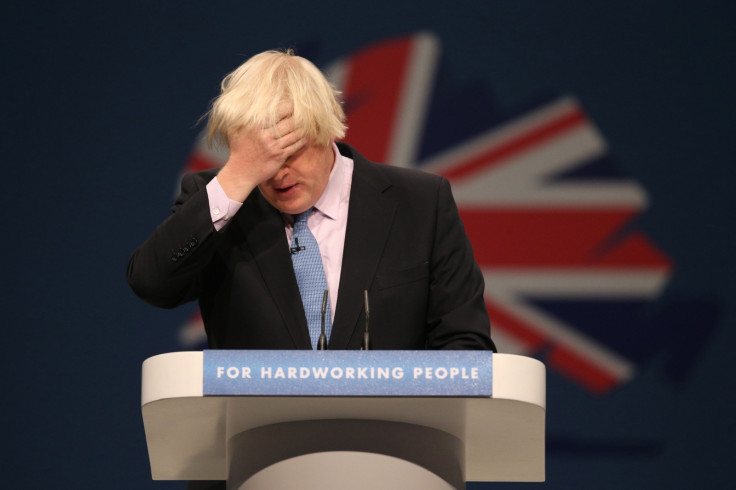Has blundering Boris Johnson been set-up by Theresa May?
Britain's new foreign secretary has already proved himself adept at changing his mind.
There are some people in politics who relish the ability to keep their personal views as private as possible – until it is advantageous to their political careers to make them public. The UK's new foreign secretary has seemingly skipped that part altogether – because his views are utterly famous. Indeed, in many ways, they are infamous – and that will make for an interesting relationship with other nations, particularly in the Middle East.
The views of Boris Johnson are rather well known – perhaps too well known. He began his career as a journalist with the Times of London, continuing in positions with the Daily Telegraph and the Spectator – and for much of that time, his journalistic contributions were commentaries and opinion pieces. In other words, he was paid, precisely, to say what he thought. Over the next few days and weeks, many will be looking through that huge corpus to derive hints about policies that he may now pursue.
On the European continent, Johnson's reputation is hardly a sterling one – a missed opportunity for him, considering he partially grew up in Brussels, and speaks several European languages.
Already, different European diplomats are censuring the new British Prime Minister, Theresa May, for appointing Johnson – someone whom they credit for being responsible for what they consider as the debacle of 'Brexit' (Johnson led the charge in this regard). The rank populism utilised in the Leave campaign, which denigrated Europe and European Union institutions, is hardly going to be forgotten any time soon.
Nevertheless, European diplomats are probably going to be dealing far more with David Davis, the newly appointed 'Brexit' minister than with Johnson – indeed, Johnson's Foreign Office is probably going to be a lot smaller than his predecessor's. There is a new minister for international trade, which means even more responsibility is being cut away from the Foreign Office as well.

Within the Arab world and Turkey, the situation is going to be somewhat different. Johnson has a Turkish ancestor, and at one point advocated quite openly for Turkey's accession to the European Union – but in more recent times, he's been harshly critical of Turkey, and particularly its current president, Recip Tayyip Erdogan. The language Johnson used in that regard is not only undiplomatic – it's rather obscene. Erdogan is not known for ignoring criticism of even the most delicate nature – and Johnson's remarks were far more explicit and lewd than most.
When it comes to the Arab world more generally, Johnson has engaged in two major faux pax already. The first was an opinion piece written not so long ago about Syria – where he advocated working with Russia and Bashar al-Assad in a strategic alliance against Isis, despite the remarkable death toll among Syrian civilians that Moscow and Damascus are responsible for.
That is unlikely to be the stated policy of May's government – and will certainly raise eyebrows among most of the UK's allies in the GCC, who are keen to see regime change in Damascus.
The second is rather more complicated, and that is Johnson's view on the major religion of the region, Islam. Unsurprisingly, he's not the most nuanced of character on the topic – on the one hand, he recently cautioned against wide-scale bigotry with regards to Islam, reminding his readers about the glories of Muslim Andalusia, and was openly critical of Donald Trump's idea of excluding Muslims from entry into the United States.
At the same time, in the aftermath of the 7<sup>th of July bombings in 2005, he took aim at Islam as a religion, with little disaggregation between extremists and mainstream Muslims. Nevertheless, after becoming Mayor of London, he moderated his views somewhat – and Muslim political leaders in the region are likely to overlook those former stances.
In the meantime, political relations between the UK and the Arab world will probably not develop to any great degree beyond what is the case at present
But the upshot of his appointment is this – few will take Johnson's pronouncements in his previous articles to be the final word on anything of much consequence. On the one hand, he has shown himself to be capable of changing his mind on more than one occasion – so one ought to expect that is entirely possible going forward on policies as well. On the other hand, May is nothing if not a shrewd political actor – and she is unlikely to have agreed to appoint Johnson as Foreign Secretary without being self-assured of being able to direct major points of foreign policy.
By appointing Johnson, May will be able to tell Brexiteers that one of their own – indeed, their most famous proponent – is in a key role in the British cabinet. She might have appointed Michael Gove, the now former justice secretary for the same reason, but severely bad blood between them precluded that, and he is now out of his position as a result.
Johnson is in – but he is not necessarily in for an extended period of time. On the contrary, part of May's calculus may indeed be that Johnson may make further political gaffes going forward, making his position untenable – but at that point, he will depart having provided May with the ability to say that she appointed a prominent Brexiteer to her cabinet. Only time will tell.
In the meantime, political relations between the UK and the Arab world will probably not develop to any great degree beyond what is the case at present – but that was always likely to be the case, regardless of who was appointed as foreign secretary. Despite protestations from the Brexit camp that leaving EU would allow the UK the space to engage more comprehensively with the world, the reality is that at least for the short term, the UK is likely to be more, not less pre-occupied with domestic and European concerns owing to Brexit.
Dr H.A. Hellyer, senior nonresident fellow at the Atlantic Council in DC and the Royal United Services Institute in London, is the author of 'A Revolution Undone: Egypt's Road Beyond Revolt'. www.hahellyer.com
© Copyright IBTimes 2025. All rights reserved.




















